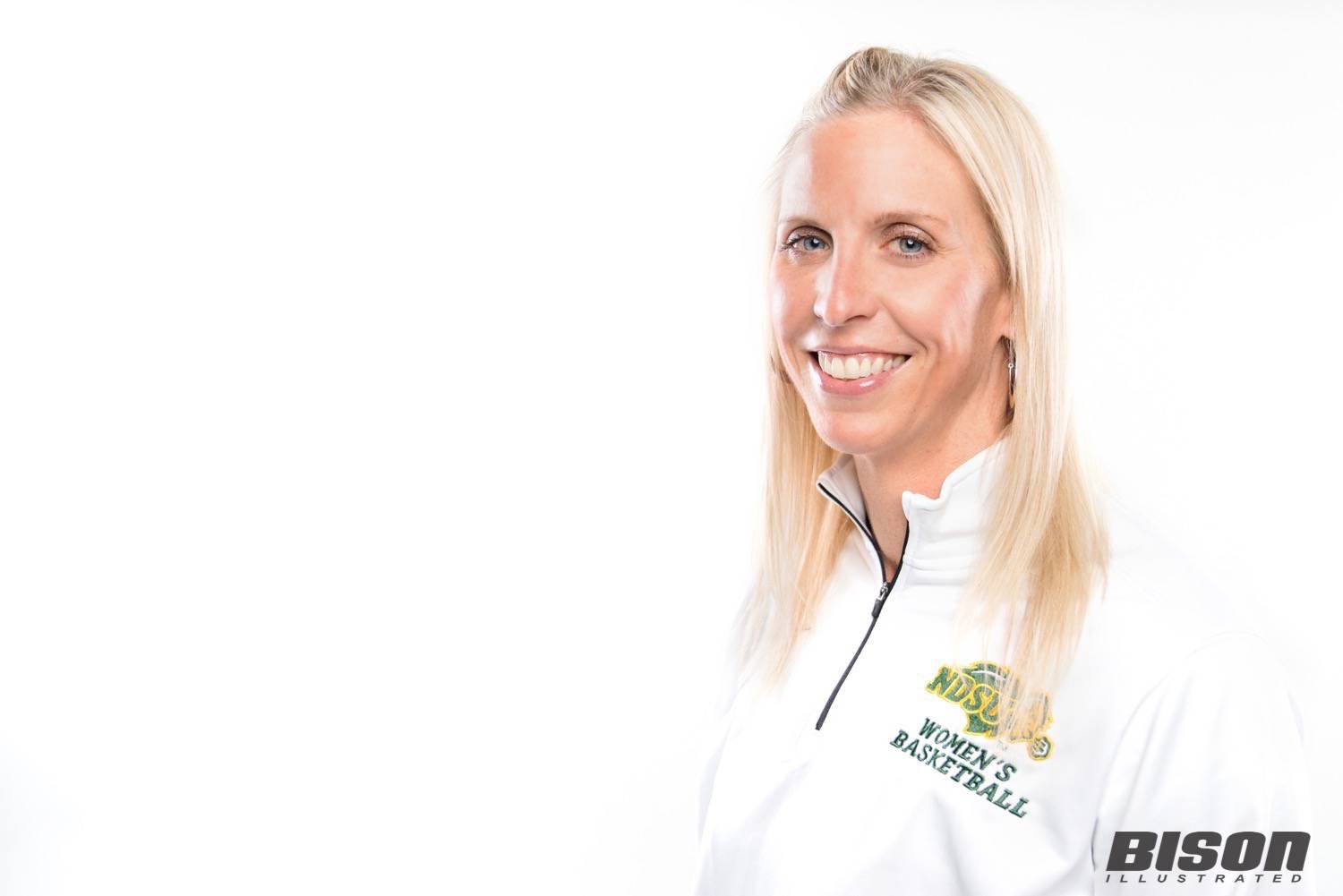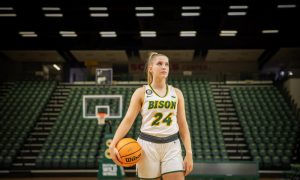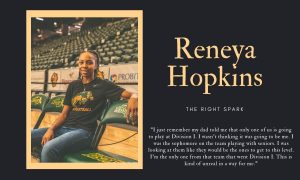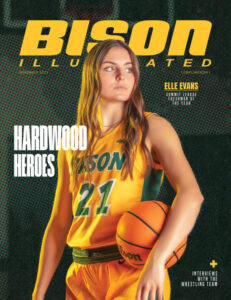Photo by Hillary Ehlen
Head women’s basketball coach Maren Walseth has instilled her same passion and fire into her team.
Maren Walseth has seen and experienced it all in the realm of basketball. As a player, she was a two-time All-Big Ten performer at Penn State and had professional stints with the WNBA’s Sacramento Monarchs, Washington Mystics and also overseas in France. Her coaching marks are perhaps even more impressive, as she was an assistant at the United States Naval Academy and her alma mater before taking the head job in Fargo in 2014.
Thanks to these experiences as both a player and coach, she knows what it takes to create a successful program. She also knows what good team culture looks like. For Walseth, her team’s culture is built upon passion and vigor for the game, two qualities she herself ascribes to. However, like anything in the game, it’s a process, but it seems as though Walseth has her team on the same page from a culture standpoint. Some of those installation tactics were formulated while Walseth was at Penn State as an assistant under coach Coquese Washington.
Washington’s basketball lineage can be traced back to her days as a player and later, an assistant, at Notre Dame under coach Muffet McGraw. McGraw has been the head coach in South Bend since 1987 and has 814 career wins to her name. When Washington and Walseth were together in Happy Valley, the Lady Lions won the Big Ten three times. Walseth reflected on some of the lessons she took away from Washington and her time at Penn State.
“Initially, when you go from being an assistant coach to a head coach, the only thing you’re 100 percent confident in is the actual basketball and the x’s and o’s. You’ve done everything else, but in an assistant role, the basketball is kind of what you hang your hat on. Figuring out how to balance a budget, managing a staff of student-athletes, managers, that’s all new to you,” she said.
“So right off the bat, it was very easy for me to bring a lot of the on-court basketball stuff that we had run at Penn State or that we’ve talked through. That was the initial thing that I brought with me. It kind of transitioned into our own style of play, our own calls that are based on our personnel and our league. It then kind of transitioned into how she mentored her staff, how she implemented leadership training, captains training, things like that.”
“As far as women’s athletics has come, there are so many inequalities. We have to balance that.” – Maren Walseth
Another item Walseth took away from Penn State was the importance of culture. While that is often seen as a buzzword in sports, it is an incredibly important one, nevertheless. Creating a culture for Walseth is a day-to-day process. However, if you watch NDSU’s women’s team, you will see that they have bought into Walseth’s system. They are on board with the Bison culture, just like Walseth and her staff.
“It’s challenging and honestly, an everyday concerted, intentional effort. It starts with getting the right kids that have the same or similar values. We don’t all have to be the exact same person but have similar values on our staff and players in the program. It’s part of the discipline and desire to work hard for a common goal, and that’s physical work but it’s also a conversation. What do you value here? What can you add to this? You need to care about her more than you care about yourself, are you into that? It’s a lot of conversations that build the communication, the trust, that makes you say, ‘Okay, now I’m bought in,’” Walseth said about creating a culture and cohesiveness within a program.
“A lot of it happens over the spring and summer with the maturity of Rylee [Nudell]’s class. To go from being sophomores and, ‘We’ll do everything the coaches say,’ to now, ‘We’re juniors and I need to hold the expectation. I, as a student-athlete, need to challenge my teammates. It’s not the coaches telling us this anymore, it’s us taking ownership and taking the reins.’ I told them at the end of the summer that I could physically feel the difference, I could feel the shift over the summer from me and our staff being the support to being able to take a step back and hold a standard and expectations and not be a cheerleader.”
Installing a consistent mindset for your team does not come without its fair share of growing pains. It’s no different for the women’s basketball program and Walseth specifically. “As a coach, there is adversity that myself or my staff have to face and work through, and you need to handle that. At the same time, you need to be able to demonstrate it and understand it towards a young player, and those can be very different. In the world of instant gratification and social media, players are accustomed to hearing how awesome they are all the time. If you’re not, you put a filter on it and you make it look awesome,” she said. “From that, it’s important that if we didn’t get the outcome we wanted, we still highlight the growth that we’ve had or the positives. Whether it’s a run the team put together or an individual effort offensively or defensively because that is what our society thrives on. We have to play into that, not in a false way, not in an “everything is always wonderful” because it’s not. If we don’t acknowledge the good things and the growths and the steps forward, we’re just making it harder, and it’s already hard.”
“I told them at the end of the summer that I could physically feel the difference, I could feel the shift over the summer from me and our staff being the support to being able to take a step back and hold a standard and expectations and not be a cheerleader.” – Maren Walseth
However, when adversity does strike the lady Bison, Walseth is quick to credit her players and assistants for picking her up in times of negativity. “For myself, I can handle adversity a little bit more negatively because it’s me and I’m in control of myself and I know what I mean by things,” she said. “When you’re communicating with another adult or a student-athlete, you don’t always know how they take things in. As much as the staff and players are looking to me, I don’t know if they know it, but I’m looking to them as well.”
With a constantly evolving game, Walseth uses her astute basketball knowledge to adapt, whether that be in recruiting, offensive sets or overall scheme. “The game has evolved, and there’s probably a handful of reasons for that. If you look at the NBA and the WNBA, each year has more and more international players and the international game has always been very different than the men’s or women’s collegiate game,” she said. “When you have that influx of style of play and talent level, the game is going to change and be more fluid, more of a shooter’s game, more up-tempo and less of a brute strength game. A lot of it can be attributed to how AAU is played. AAU, at least on the women’s side, most AAU programs play more games than they practice. So some of the technical skills, some of the nuances, some of the set plays that were more common in the 90s and 2000s, they don’t do that in practice. So it is more of a fluid game.”
The Bison have had an influx of European talent on their team as well. With five international players, their own style of play has become more fluid too. While Walseth says they have not made a concerted effort to recruit international girls, it’s clear it has helped the Bison on the court. She says they have adjusted their offensive scheme to give their players multiple options to score, rather than running set plays. “I like to be able to coach our players to be basketball players. Personally, I don’t know if I would have been a very good player right now. I like the physicality of it, but I don’t know if I would have flourished in the game necessarily. I had a 15-foot range and that was about it, but I do like where the game is,” she said. “I think it’s fun to watch. Women’s basketball often gets critiqued for the athleticism or not having the dunks or having some of the wow moves, but when you allow players to play freely, you get some of that. You get more of the individuality and their style of play and the flash that sometimes you don’t get in a banger, grind it out game.”
Not only has the game of basketball changed, but women’s athletics has seen steady growth over the course of Walseth’s coaching career. From where it was, there has been significant progress made. However, over the course of the last 20 years, Walseth has one moment she believes pushed women’s athletics to the stratosphere. “When I think back, the 1999 World Cup when Brandi Chastain tore off her uniform, that was a big moment for women’s athletics. It showed we don’t have to be as modest as we think we should because men’s athletics is not that way,” she said. “That moment allowed someone like the Williams sisters to be the personalities that they are. Now, they might’ve done it anyway, but it makes it more acceptable, in women’s basketball, the growth of the WNBA and the starting of the WNBA and how they went about that. More recently, just the coaches and athletes, mainly professionals, who speak to the inequalities and the growth in their individual sports. I don’t know if there’s one thing, but certainly, the media has helped it.”
That is not to say there’s no room for growth. Walseth quickly indicated that we cannot have the conversation about growth without pointing out shortcomings, too. “There is also a caveat because as far as women’s athletics has come, there are so many inequalities. We have to balance that. We’ve come a long way for basketball, there is a solid professional basketball league for women in the United States, that’s fantastic. But they are so underpaid that the conversation has to have both pieces to it,” she said. “My ears perk up when we talk about the positives, to make sure we understand we have not arrived and there are still ways to grow. At the same time, we’ve come a long way.”
That is as profound a statement as any from Maren Walseth. Sure, she has done a successful job at NDSU in creating a culture within the women’s basketball program. Her girls have bought into it every day. However, just like women’s athletics as a whole, there is always room for growth and progression. For Maren Walseth, Bison women’s hoops and women’s athletics, the future and potential is incredibly bright.










